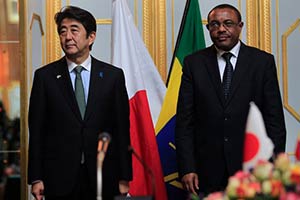 The project for the construction of TICAD Human Resource Development Center for Business and Industry has received a grant aid of 2.931 Billion Yen. This after the Government of the Federal Democratic Republic of Ethiopia signed an agreement with the Japan International Cooperation Agency (JICA) in Addis Ababa.
The project for the construction of TICAD Human Resource Development Center for Business and Industry has received a grant aid of 2.931 Billion Yen. This after the Government of the Federal Democratic Republic of Ethiopia signed an agreement with the Japan International Cooperation Agency (JICA) in Addis Ababa.
The project has been funded to create training facilities and procure equipment for mobilizing human resources to extend kaizen which is a Japanese philosophy and technique for improving quality and productivity as a part of the Ethiopian Kaizen Institute (EKI) initiatives.
The Ethiopian government is bullish on revitalizing its manufacturing industry, particularly the lighting technology industry, displaying a dramatic shift from a traditional agrarian economy to an economic structure centered on industrial competitiveness. One of the key measures toward this goal has been to introduce, the kaizen methodology which has brought successful factory development to the manufacturing industry of Japan. In 2011, EKI was established as a primary agency of Ethiopia focusing on human resource development and extending kaizen by putting it into practice. Various projects such as Capacity Development for KAIZEN Implementation for Quality and Productivity Improvement and Competitiveness Enhancement, technical cooperation, have been boosted due to JICA and this cooperation has strengthened the organizational system and kaizen leadership capacity at EKI. Thus far, EKI has been providing training and carried out other initiatives to introduce kaizen to private companies in Ethiopia. The Government aims to make EKI a nodal agency for KAIZEN in Africa, and is greatly increasing the staff and otherwise strengthening the functions of EKI. However, the existing facilities at EKI do not have the space or equipment for a training facility, and therefore training is currently be carried out off premises. EKI instructors are also required to visit the organizations and companies where the training is provided. Currently target locations are limited to Addis Ababa and nearby areas, but eventual extension of kaizen throughout the country is on the goalsheet. Therefore, providing equipment and lodging facilities where training can be provided to human resources in other regions is a priority.
The project will provide a building for training, management and administration, and a building for lodging, and procure training equipment. This will make it possible for EKI to increase the current number of annual kaizen trainees by more than 1.7 times to more than 50,000 people. The project is a specific example of a “TICAD industrial human resource development center” that the Government of Japan announced would be set up at the Fifth Tokyo International Conference on African Development (TICAD V) in 2013, and will contribute to the training of “30,000 industrial human resources in Africa” and to “increasing productivity by 30 percent through the Kaizen Initiative,” pledges made by the Government of Japan at the Sixth Tokyo International Conference on African Development (TICAD VI).



